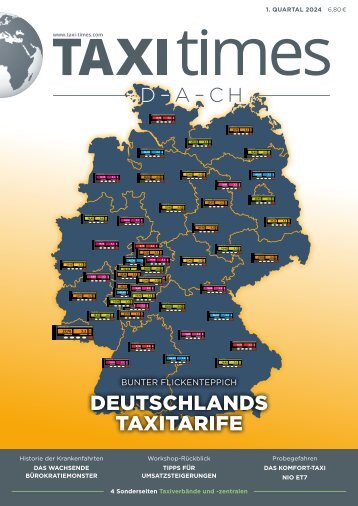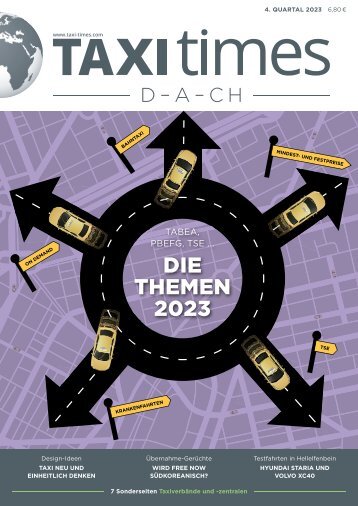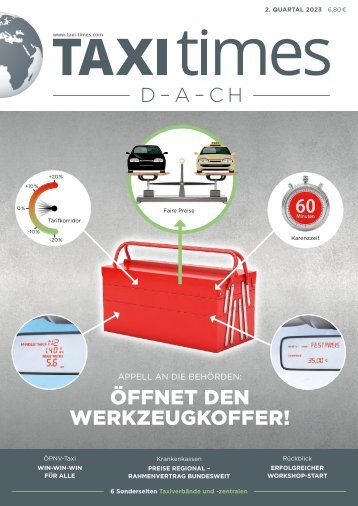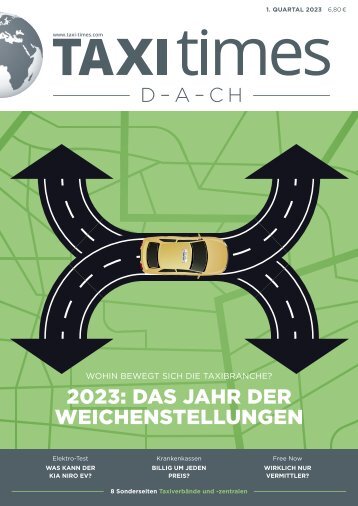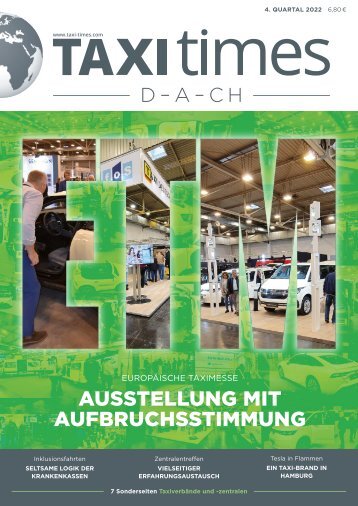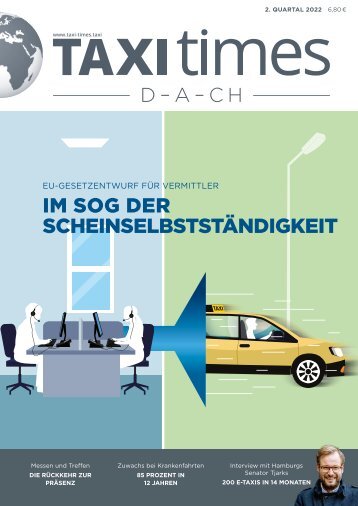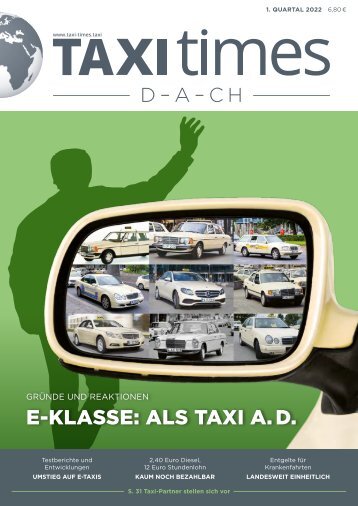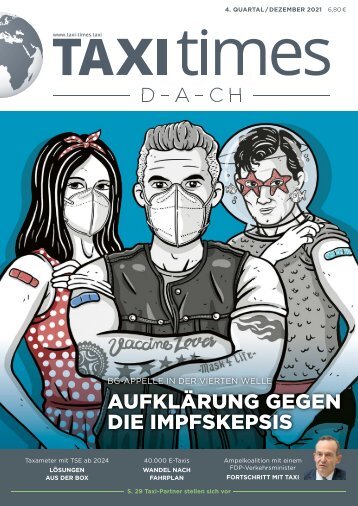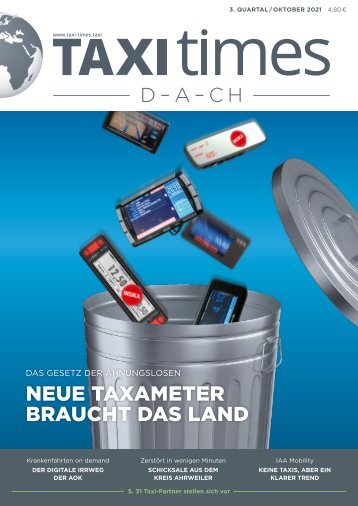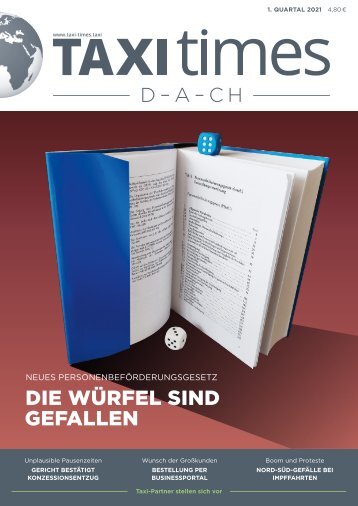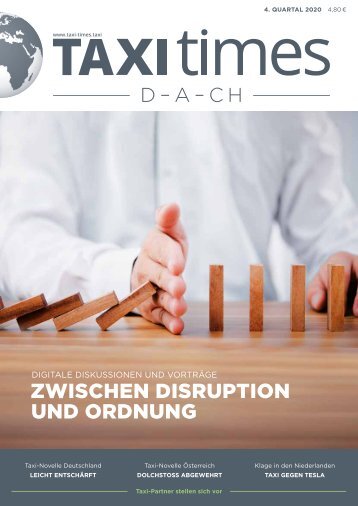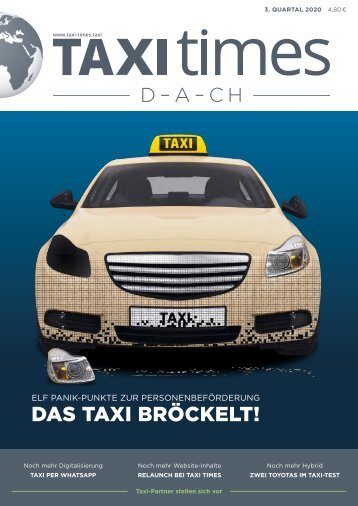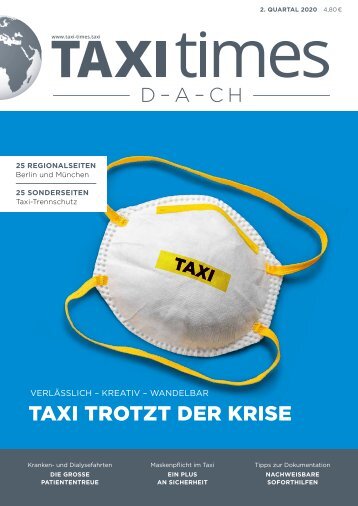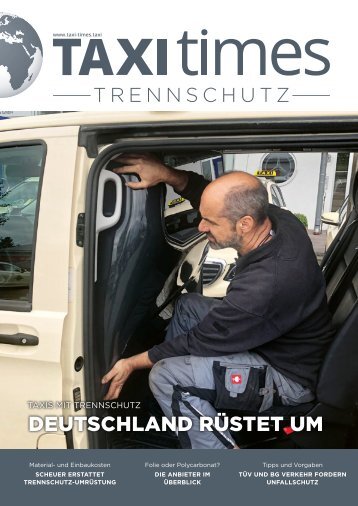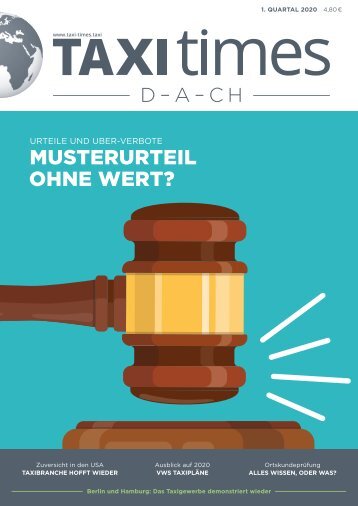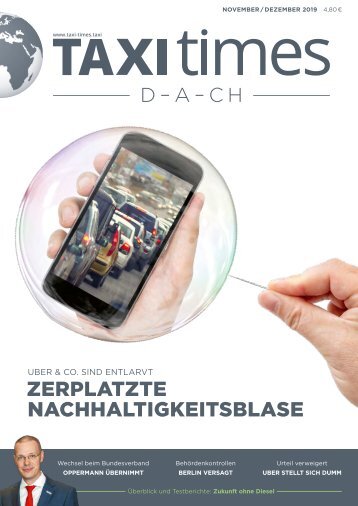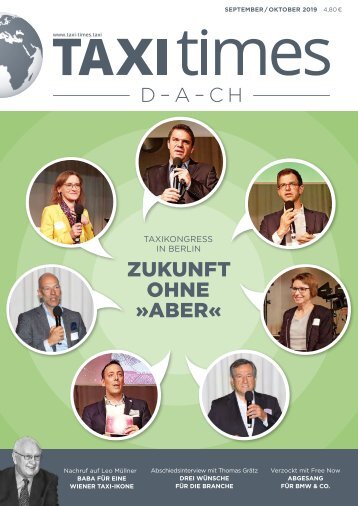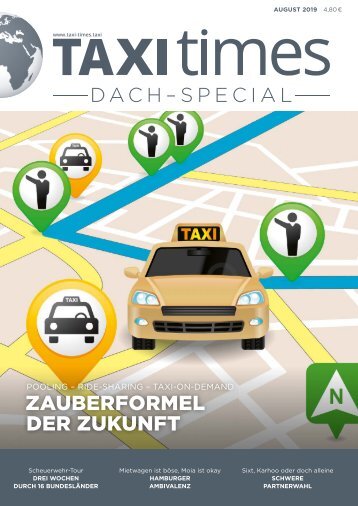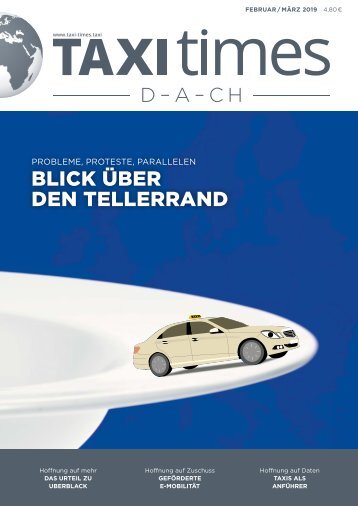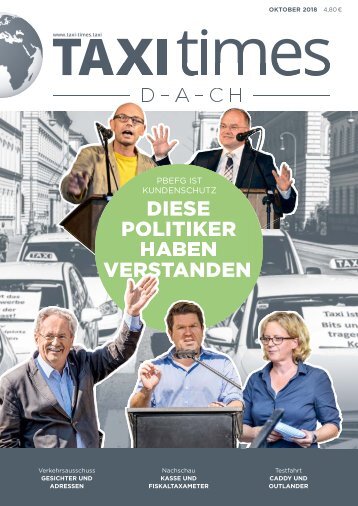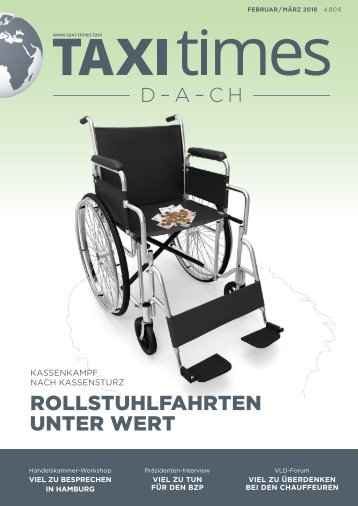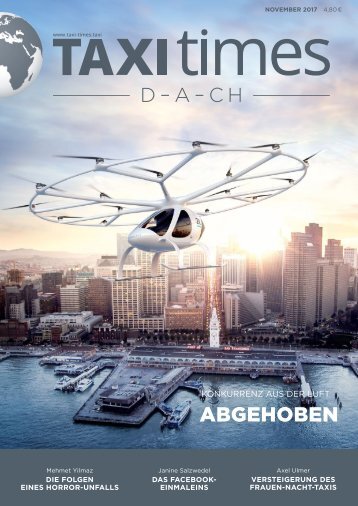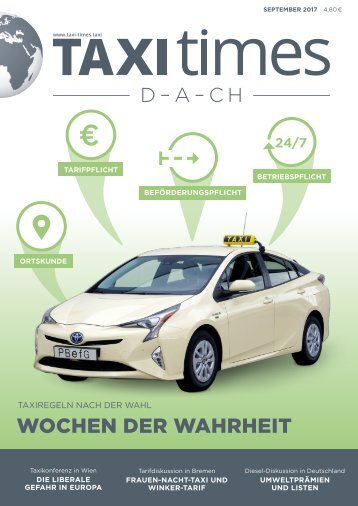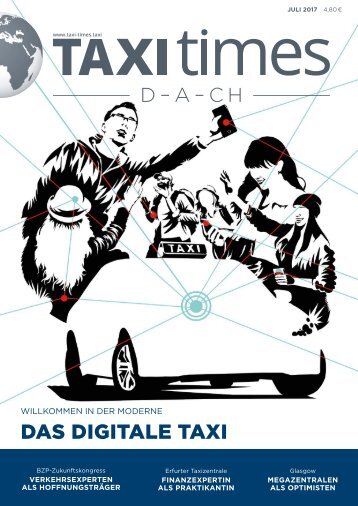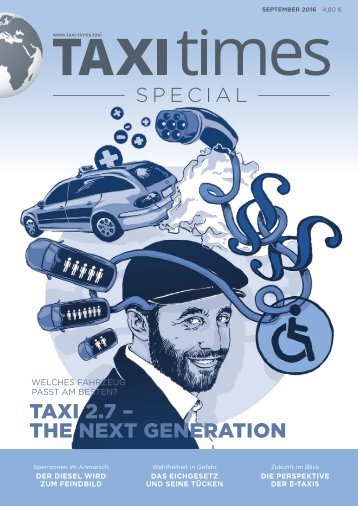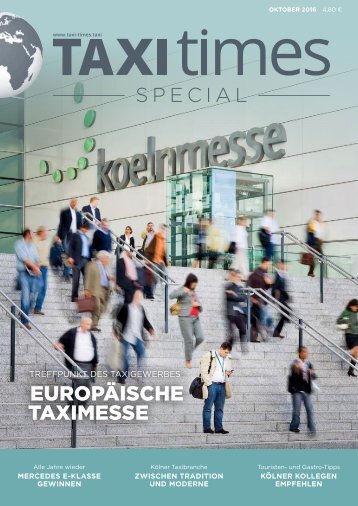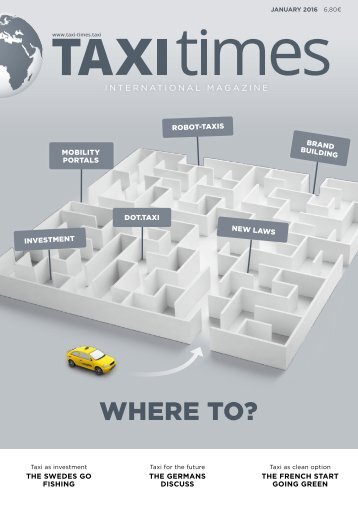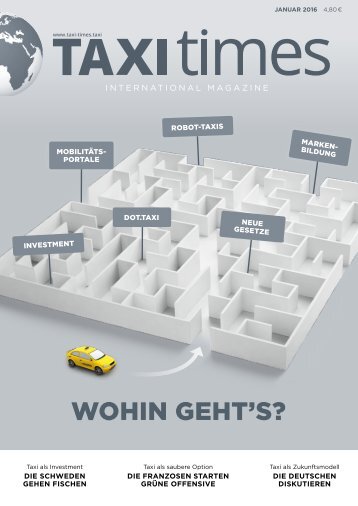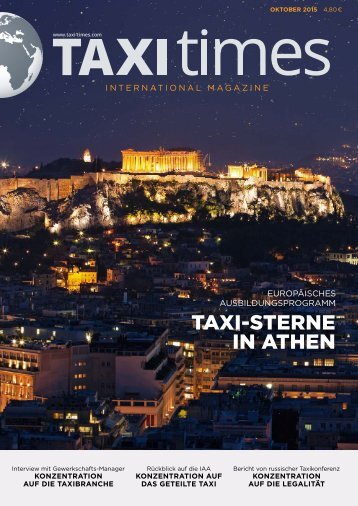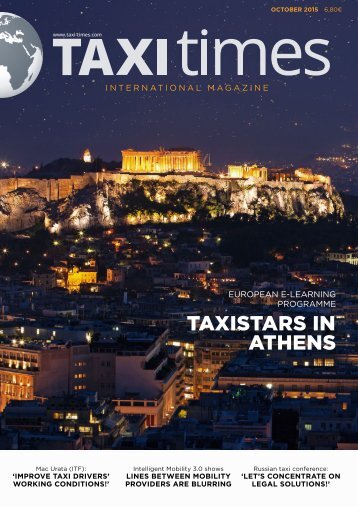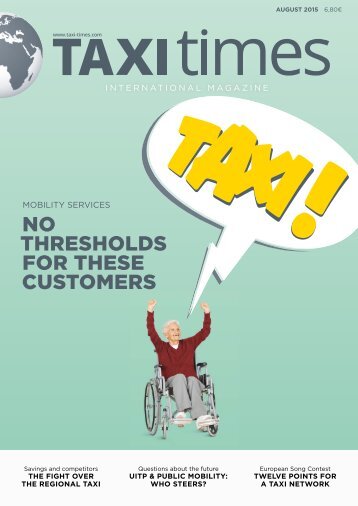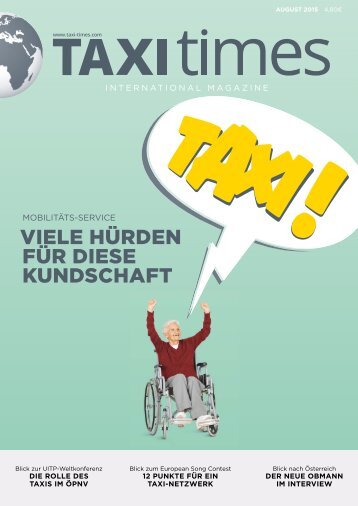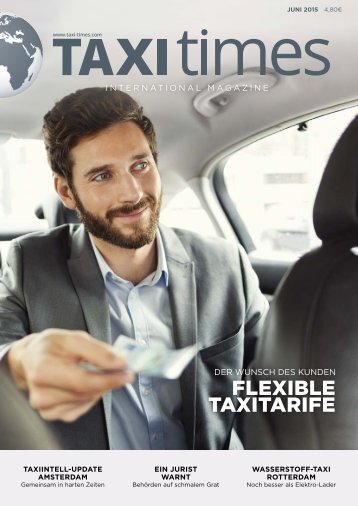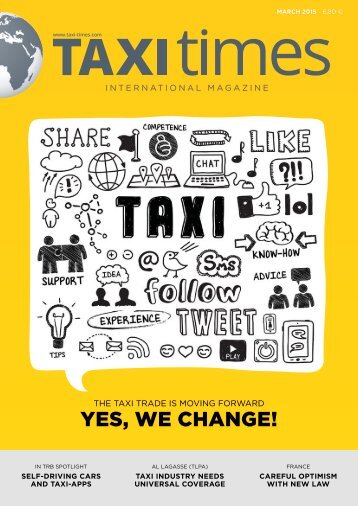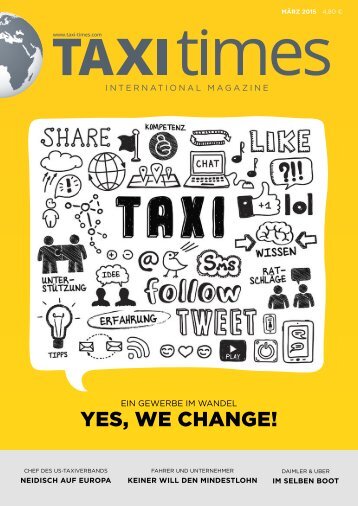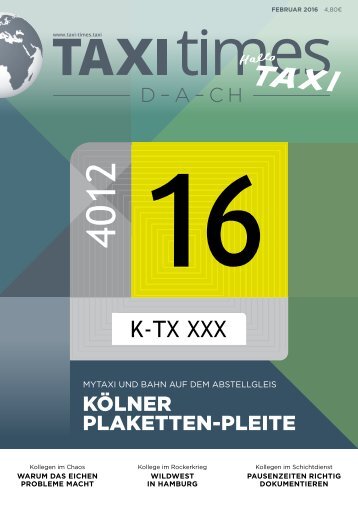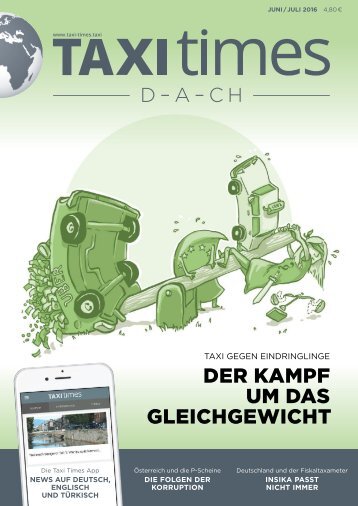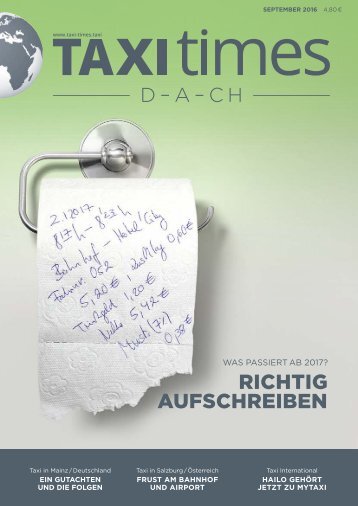Taxi Times International - August 2015 - Deutsch
- Text
- Mobility
- Taxis
- European
- Vehicles
- Transportation
- Uitp
- Drivers
- Elderly
- Trips
- Regional
OUR COMMENT NEWS Jürgen
OUR COMMENT NEWS Jürgen Hartmann and Wim Faber. DUTCH TAXI ASSOCIATION LAUNCHES CRISIS MEASURES THE END OF THE TAXI? WHO SAYS SO? Unbelievable: A large car manufacturer is successfully extending its role in the taxi industry and at the same time predicts the end of that same taxi industry from 2020. Curious. July was an interesting month for Renault- Nissan CEO Carlos Ghosn. At a tech-conference in Aix-en-Provence he had barely predicted that autonomous vehicles would STRONG MESSAGE A clear example! In this issue of Taxi Times we are also reporting on IRU’s Global Taxi Network (GTN). This time mainly on the activities of one of its founding member at the European Song Contest (ESC) in Vienna in May. Congratulations to the winner Sweden! But also to taxi.eu, an App which, without millions from some hedgefund, was capable of supporting this event not only financially but – with as its partner the main Vienna radio circuits – also delivered many of the stars of the evening as transport partner. This way the ‘old-fashioned’ taxi trade sent a strong message to those outside ‘Global Players’ who – financed from outside the industry – are worming their way into transport market. replace taxis by 2020, or his own company was finally given the green light to proceed with exactly that: supplying taxis. Nissan will be supplying the New York taxi industry for at least 10 years with the now mandatory Taxi of Tomorrow, the NV-200. So it was a good month for Nissan, which has shown a keen interest in the taxi industry over the past years – spearheading its advance with its Leaf e-taxi and the NV-200. Ghosn made the proviso that local authorities would have to give the green light for the operation of autonomous vehicles. But not a word about the people driving today’s taxis. The service providers behind the wheel who are much more than reliable sources for foreign journalists or great savants in various fields: from the weather to politics and soccer. They are more than a driver, psychologist or a navigation system. Not only do they use their knowledge to steer the customer quickly and efficiently in the right direction. They also provide assistance in many different areas. They provide their clients with useful tips and are often seen as the ambassadors of a city. Regularly they physically assist the client group we’re focusing on in this issue: elderly people and those with mobility handicaps. For these groups the taxi trade plays a special role and to them taxi drivers are even more important. As Gunta Anca of the European Disability Forum (EDF) underlines in her guest commentary, taxi drivers (can) do so much to improve the trip for the mobility-impaired. So far this is a customer group very much ignored by the Transportation Network Companies (TNC’s), the app-based so-called ‘taxi’ services. Particularly in this area, the taxi industry will undoubtedly keep playing an important role. But just like public transport, it has to prepare for major change. Worldwide megatrends like increasing urbanisation and connectivity will lead to growing inter-modality and new concepts (and business models) for door-to-door transportation. Jürgen Hartmann EDITOR Wim Faber EDITOR PHOTO: Gudrun Hartmann PHOTO: Wim Faber, Kia Seat KNV Taxi-chairman Eckhardt: ‘More recognition for taxi trade’ As 60% of Dutch taxi companies write their annual reports in the red and competition in the contract sector (75% of taxi turnover in The Netherlands – around € 1,2 billion) has become so stiff that prices are in a continuous downward spiral, survival has become the name of the game. Last year KNV Taxi, Dutch taxi association’s then new chairman, Bertho Eckhardt, presented a rough outline of possible new policies. This year, mid-June, after consultation with specialists and members, he came back with specific measures aimed at resurrecting the Dutch trade. “Taxi should become a standard element in transportation. We believe in the strong social value of the taxi. It should be a normal thing to take a taxi.” With the structure of the Dutch trade changing fast and contracts (mainly transporting school children, the elderly and people with mobility handicaps), drying up through steep government cuts (just at a time where these groups need extra help, not less), Eckhardt predicts this contract activity will become a ‘niche market.’ Things are not much better in the street hail sector with its high VOTE FOR BEST TAXIS WITHOUT MARKET LEADER Taxi of the year with best comfort: Kia Carens. Every two years since 2011 a German specialist magazine had its readers choose the “Taxi of the Year”. For this event, several selected taxi companies and magazine readers meet up for two days to rate the different models being voted on. This vote is based on personal impressions made during short test drives or by using the car’s technical data. 26 test drivers met at this year’s vote in July and rated 14 taxis provided by different manufacturers. fares and a persistent reputation problem. KNV Taxi believes in building alliances – for instance with public transport in providing different and more flexible forms of transportation. There is also an opportunity in combining various forms of contract work, something which has been discussed for the past years. With the latest changes in IT, it is the customer (even the large organisation) who steers his mobility. “And the demand for mobility is not going to disappear”, Eckhardt underlined. “Future mobility structures won’t be defined by the organisations supplying transportation, but by technological applications which are on the market.” The future? There will be more ‘applification’, the autonomous car is coming and demographic processes are changing the trade. KNV Taxi’s solution: segmented transport becomes integrated transport, the client decides on the type of transportation, these jobs should be well-priced – not cheaply priced, the client is centre stage and both driver and customer should be able to score each other. Fares for street hail should be lower and that product’s negative perception should improve. Without mentioning the relevant partners, Eckhardt indicated KNV Taxi is working with partners to create mixed and more flexible transport systems. The data from these jobs should help improve mobility overall. “We would like the taxi trade recognised as the oil in the social machinery.” wf Taxi of the year with best functionality: Seat Alhambra WITH HARDLY ANY GERMAN MANUFACTURERS Just like in 2013, the Volkswagen and Mercedes-Benz brands were missing. Together these two account for more than 80 percent of all German taxis. As Opel, another manufacturer that produces in Germany, stayed away from the event, there were only importers sharing the winners’ rostrum. There were awards in the two vehicle classes saloons/estates and vans for the categories economic efficiency, functionality, comfort and emotion. The Skoda Superb managed to win in no less than two categories, while Toyota also provided three winners with its three models entered. The Prius+, Auris Estate and Lexus 300h. Other winners were the Seat Alhambra, Nissan e-NV 200 and Kia Carens. jh 6 TAXI AUGUST / 2015 7
- Seite 1 und 2: AUGUST 2015 6,80€ www.taxi-times.
- Seite 4: PEOPLE NISSAN’S CEO PREDICTS THE
- Seite 10: MOBILITY SUPPORT Valys: national do
- Seite 14: MOBILITY SUPPORT DORMANT BUSINESS M
- Seite 18: FLEET MANAGEMENT The taxi company V
- Seite 22: GLOBAL TAXI NETWORK GLOBAL TAXI NET
- Seite 26: NEWS NISSAN’S ‘TAXI OF TOMORROW
Unangemessen
Laden...
Magazin per E-Mail verschicken
Laden...
Einbetten
Laden...
